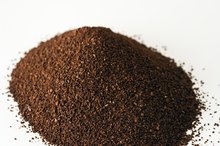Does Coffee Really Give You Energy?
Exalted by some and reviled by others, coffee is part of the daily routine of approximately 55 percent of adult Americans, according to the National Coffee Association. If you are a coffee drinker, the mild pick-me-up effect associated with a cup of java is not lost on you. The surge of energy you experience from drinking coffee comes from the mild stimulant effect of caffeine on your brain. Black coffee contains a minuscule number of calories and is, therefore, a negligible source of energy from a nutritional standpoint.
Nutrient Value
Black coffee is not calorie-free, although it's close. Coffee beans are the seeds of the coffee tree. Like other plant seeds, coffee beans contain natural fats, sugars and protein. Small amounts of these nutrients are present in coffee, although the dilution from water makes the final concentrations extremely low. A cup of plain, black coffee contains approximately two calories. Thus, the few calories in black coffee are not responsible for the increased sense of energy you experience.
Caffeine Effects
Can Drinking Coffee Cause Dry Mouth?
Learn More
Regular coffee contains caffeine, a fat-soluble chemical that easily passes from your bloodstream into your brain tissue. Your brain activity is controlled by chemicals called neurotransmitters, which either stimulate brain cells or quiet them. Adenosine is a quieting neurotransmitter. Caffeine attaches to adenosine receptors on your brain cells, blocking the quieting effect of this neurotransmitter. The net effect of caffeine, therefore, is stimulation. The increased activity of your brain cells under the influence of caffeine leads to a secondary rise in the amount of epinephrine in your body. Epinephrine is the "fight or flight" hormone, which has stimulating effects on your brain and body.
Metabolic Energy vs. Mental Alertness
Mental alertness and physical energy are not the same thing. From a metabolic perspective, energy refers to the power that enables your cells to perform the "work" of living. Your muscles, for example, require energy to contract. Similarly, your brain cells consume energy, enabling you to think and learn. Your body produces energy by metabolizing carbohydrates, fats and proteins from the food you eat. The calorie is the unit of measure used to quantify the energy-generating capacity of foods.
Caffeine from coffee is not an energy-generating substance, metabolically speaking. In other words, your body cannot metabolize caffeine to power your cells. Just as an antidepressant or pain reliever does not provide calories, neither does caffeine. The stimulatory effects of caffeine on your brain, however, give you the perception of increased "energy" because you feel more mentally alert.
Coffee and Health
Does Coffee Dilate Blood Vessels?
Learn More
The effects of coffee on health have been widely studied and the research results are mixed, with some apparent benefits and other potential risks. For example, evidence suggests that coffee may have protective effects on your liver. The cardiovascular effects of caffeine from coffee, however, may be problematic if you have heart disease. Most — but not all — doctors believe that one to two cups of coffee daily are not harmful. Talk with your personal physician if you have questions about whether coffee is safe for you.
Related Articles
References
Writer Bio
Dr. Tina M. St. John owns and operates a health communications and consulting firm. She is also an accomplished medical writer and editor, and was formerly a senior medical officer with the U.S. Centers for Disease Control and Prevention. St. John holds an M.D. from Emory University School of Medicine.









